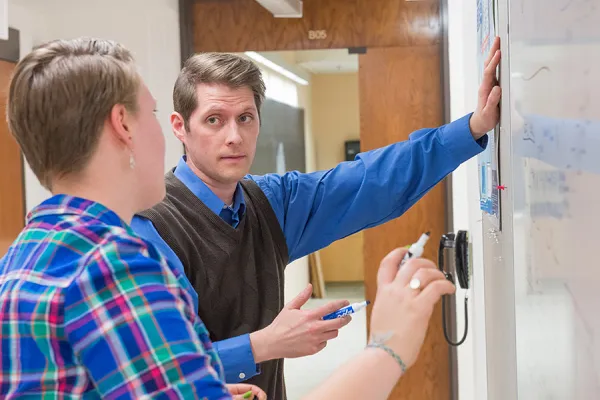Prof. Williams Awarded Prestigious NSF CAREER Award for Research on Atomic Beryllium
Research & Inquiry

Published May 23, 2016
Assistant Professor Will Williams’ work in experimental physics focuses on the behavior of the tiniest building blocks of the universe: atoms.
“If we can understand how atoms behave, then we can understand how bigger things behave,” says Williams, who has been teaching physics at Smith for three years.
Williams is the recipient of a National Science Foundation Faculty Early Career Development (CAREER) award—the agency’s most prestigious award in support of promising junior faculty members. His proposal for research on “High Precision Spectroscopy of the Beryllium Isotope Chain” is among the projects chosen this year for five-year federal grants through the highly competitive NSF program.
Award recipients “exemplify the role of teacher-scholars through outstanding research, excellent education and the integration of education and research within the context of the mission of their organizations,” says a description on the NSF website.
Earlier this year, David Gorin, assistant professor of chemistry and biochemistry at Smith, received a CAREER award for a project on developing chemical reagents.
Williams—who earned a Ph.D. in experimental cold atom physics from the University of Wisconsin-Madison—says his interest in finding new ways to test atomic theories grew out of his postdoctoral work at the Argonne National Laboratory in Chicago.
“I had incredibly supportive mentors among the nuclear physicists there,” Williams says. “I went into idea-development mode, and one of the projects I came up with was about beryllium.”
Beryllium—the fourth element on the periodic table—is a metallic element that has recently become important to the atomic physics community, Williams says.
In his lab at Smith, Williams is using lasers to make precise measurements of the energy levels in three isotopes of beryllium atoms—two of which are radioactive. The energy levels contained by those atoms help reveal how beryllium’s subatomic particles come together to make the atom act the way it does, as well as affirming scientific theories that attempt to describe that behavior.
The NSF award will support a post-doctoral researcher for Williams’ lab. Smith students will also be working on subsets of his larger research project on beryllium.
Williams notes that studies of atomic physics date back to ancient Greece. The field advanced in the 1920s with the development of quantum mechanics, and again in the 1980s with advances in both computer and laser technology.
Williams hopes his NSF-funded research will help ensure future advances by testing theories about how atoms behave.
“There’s a huge mathematical framework behind this,” Williams says. “The theorists know we are doing this work, and they are eagerly awaiting the results of our experiments. We’re working hand in hand to advance our knowledge of atomic physics.”